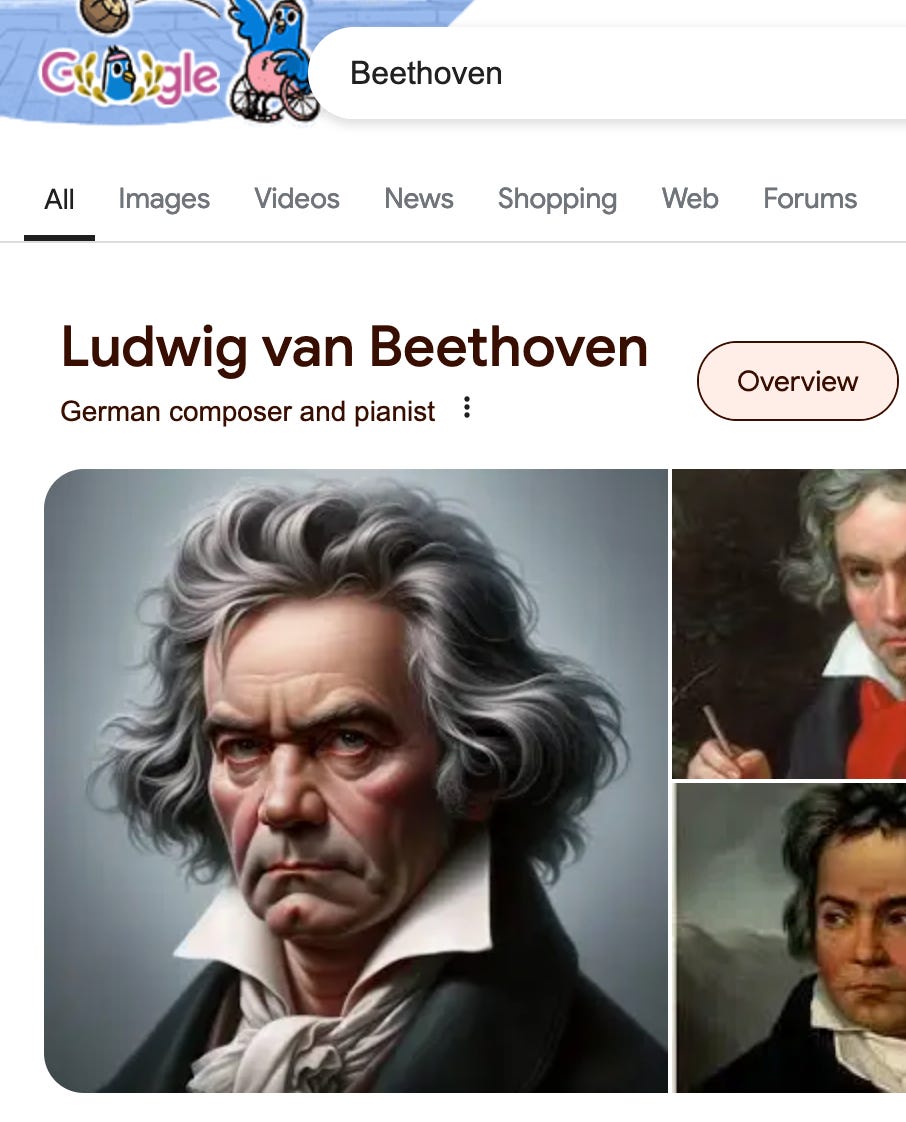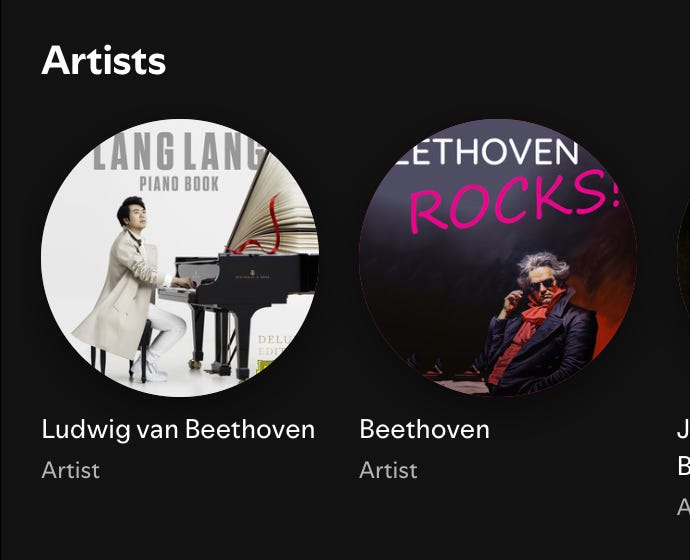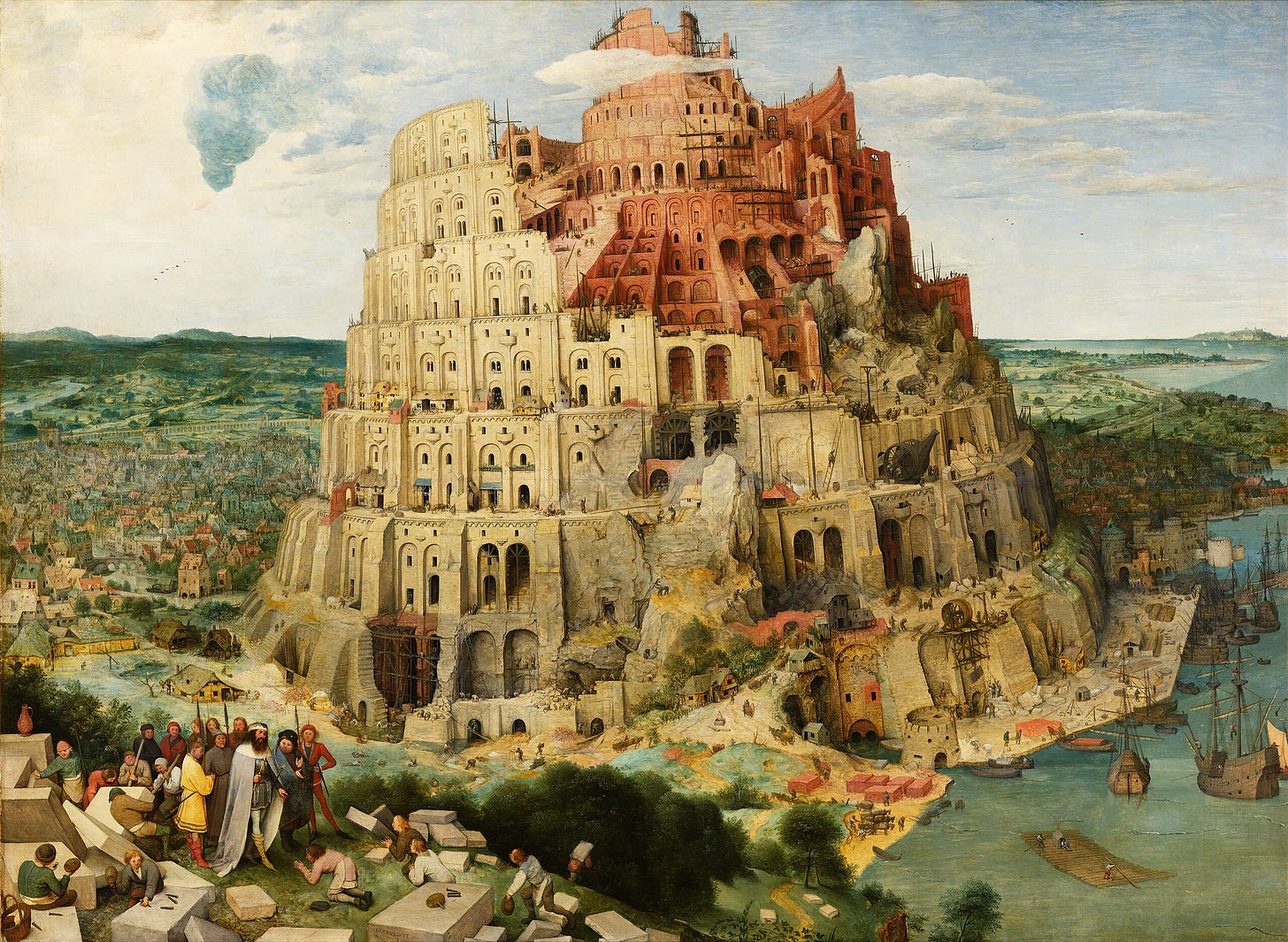Google Thinks Beethoven Looks Like Mr. Bean
Instead of real portraits, Google serves up AI-generated garbage
At first, I thought it was a prank.
A Reddit poster shared the Google search results for Beethoven—and the image at the top was so goofy.
That face made me laugh, but it also looked vaguely familiar. Finally, I figured it out—Google’s version of Beethoven looks like Mr. Bean on a bad day.
But this can’t be real. Google can’t have failed that badly.
So I did my own search—and got the exact same result.
This was no prank. Google really thinks Beethoven looks like this.
But it’s even worse than Spotify’s avatar of the esteemed composer—where you at least get a choice between a silly AI image of Beethoven as cartel boss hanging out at Studio 54 and a photo of Lang Lang staring dreamily into space.
If you want to support my work, please take out a premium subscription (just $6 per month).
We’ve all seen AI-generated images like this. But actual portraits of Beethoven exist, and are easy to find on the web. So why does Google prefer this ridiculous alternative?
I decided it must be a fluke.
Google made a mistake with Beethoven. It couldn’t be intentional. It wouldn’t happen again.
But when I posted the Beethoven picture on social media, people responded with more examples.
Google’s version of Isaac Newton, for example, looks like he just got rejected at an audition for a 1970s prog rock band.
Not all of the images are quite this bizarre. But I’m disturbed how often Google prefers digital constructs over surviving portraits and even photos. After all, we actually know what Chopin looked like—we have his photographic image.
He appears unhealthy in his photo But that’s shouldn’t surprise anybody. Chopin died from tuberculosis at age 39.
But Google wants something more formidable. These famous composers are serious dudes—and web surfers need to read it in their faces.
So everything is cleansed and intensified. The visages are filled with badass effrontery. The gazes are mobster staredowns.
That’s why Google’s preferred version of the Polish composer vaguely resembles the killer Anton Chigurh in No Country for Old Men.
Don’t mess with Frédéric!
This is what classical music composers might look like in a first-person shooter video game. These gangstas are always leveling up.
But none of this is real. Karl Marx actually looked more like Hagrid or Jack Black—and nothing like the ready-for-Mount-Rushmore image Google serves up. Haydn didn’t really have a face as thin as a horse’s.
I’m less sure of Shakespeare, but I doubt that he leered like Paul Giamatti after the third glass of pinot noir.
After seeing a dozen or so of these digital constructs, I started wondering about the tech mindset that prefers zonked-out fakery over historical accuracy.
If Google is willing to take these liberties with an image—where you can immediately spot the spoof—what are they doing with all those AI-generated texts polluting the web.
Those texts are hard to factcheck—much harder than an image. But it’s scary to think how far the search engine results may be deviating from historical accuracy.
But we are still in the early stages of AI pollution. As AI images like this spread over the Internet, they will inevitably get used to train the next generation of bots. This creates a race to the bottom.
Studies show the dangers of training AI with AI inputs. The results get worse and worse. But how can you prevent it when AI content is everywhere, and almost never disclosed as such?
Those huge AI companies have caused this by making the most boneheaded mistake of them all. As any ranch hand can tell you, you don’t dump your waste products into your drinking water.
But that’s exactly what’s happening with AI contamination in the culture—the degraded outputs become inputs for the next round of bot technology.
It’s not hard to understand the risks. We’re feeding our robots with garbage, so don’t expect them to regurgitate it as a gourmet meal.
I know some writers and scholars who are actually happy about this.
They believe that real human experts will become more valuable in the future. Digital sources will get so contaminated that a person with genuine knowledge and pressure-tested facts will have more authority than ever.
By the same token, an actual physical book from the pre-Nvidia era will soon be revered and cherished—embraced as our last connection to solid information before Google gobbeldygook flooded the digital highways.
I believe this scenario is quite plausible. That’s why I spend so much time and energy promoting arts and humanities, and celebrating our rich legacy of creativity and genius inherited from the past.
A bot can create a fake picture of Shakespeare, but it can never read Shakespeare for me.
So, frankly, I have no concern whatsoever that my vocation or way of life will be threatened by AI. I am personally more likely to benefit.
Many of you probably feel the same.
But we can take no satisfaction from the current elevation of fakery over the real. Society is going to overdose on deception. And resuscitation will be difficult.
Even if Google makes Karl Marx as pretty as Timothée Chalamet, it’s still ugly for the culture. And the prettier they make everything on the screens, the uglier it gets in the lived world.
I’ll admit that I have a morbid curiosity to see how this plays out. Epic fails can be fun to watch—provided you are a safe distance away.
I doubt I will need to wait long—the monomaniacal AI cult members are making the largest capital investments in history to accelerate this replacement of the real with the bogus. They can’t get to the finish line fast enough.
In this kind of environment, things are going to hit a wall very soon—almost certainly within the next 12 months.
Cults that deny reality don’t have a good track record. And eradicating reality is the single biggest priority for the creepy cult now in charge of Silicon Valley. Sober minds can already see where this is heading.
My advice to others is to keep a safe distance away from the AI cult centers—because this blow-up will be spectacular. You don’t want to be collateral damage and definitely don’t want to be sitting at the epicenter.
Afterwards we can start worrying about how to pick up the pieces and build something better.














Agreed, Ted. The next new money making industry of the latter part of the 21st Century will be cleaning up the mess created be industry. Somebody will come up with a clever way to remove the flotsam and jetsam of chemicals and plastics in our oceans and some others will embark upon restoring our cultures to pre-AI and Big Tech ravages.
I understand that paper copies of dictionaries and reference books like encyclopedias are becoming fewer and fewer. They are all online these days.
I have subscribed to the Merriam-Webster Dictionary online version for many years. I have my own hard copy versions of the Webster’s Third International Dictionary as well as the 20 Volume Oxford English Dictionary. I use dictionaries daily. It is convenient to refer to the online version when I am out and about and want to check a word I do not know or one on which I am not quite certain.
The Webster’s online version was tremendously handy when I was away from home. This online version was an exact facsimile of the print version.
But on a day, which for me will live in infamy, back in 2013, I logged onto the online version and was horrified. Webster had drastically changed the online version and dumbed it down. I expressed deep dissatisfaction to Webster. They replied that it was a project to make the dictionary easier to use. I wrote them back and beseeched them to restore it to the way they had it before. I even offered to pay a higher subscription fee. The dictionary could have a tiered subscription. The top tier would be the unabridged version of the Webster’s Third International which is of invaluable service to writers and editors, researchers and scholars. The bottom tier, the one they had just launched, the one with the pictures of duckies and Tele-Tubbies would be an option for whoever wanted it. My lament of course, fell upon deaf ears.
Lesson: HOLD ONTO YOUR PAPER COPIES OF REFERENCE BOOKS. We will need to rely on them.
I fear that the aberrations that seem silly or outrageous to us now will soon be a common, accepted standard. We know what the difference is, but the generation growing up amidst AI pollution will have no former knowledge to which to compare these false portraist or texts.
My husband Peco and I recently published "A Guide to Booklegging- How (and why) to collect, preserve, and read the printed word", which provides a practical starting place for perserving our "semantic mountains".https://schooloftheunconformed.substack.com/p/a-guide-to-booklegging-how-and-why
"The bookleggers smuggled books to the southwest desert and buried them there in kegs. The memorizers committed to rote memory entire volumes of history, sacred writings, literature, and science, in case some unfortunate book smuggler was caught, tortured, and forced to reveal the location of the kegs…
The project, aimed at saving a small remnant of human culture from the remnant of humanity who wanted it destroyed, was then underway."
- from A Canticle for Leibowitz by Walter M. Miller